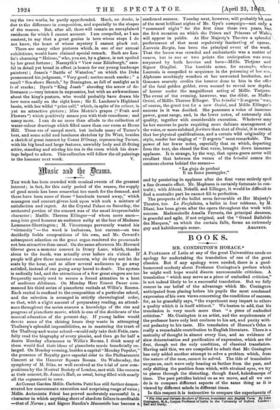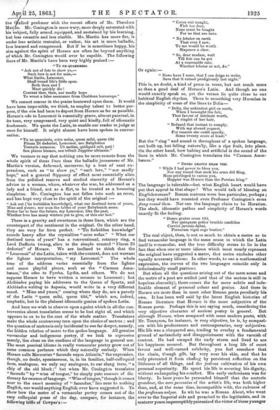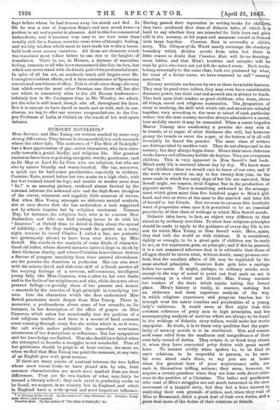BOOKS.
MR. CONINGTON'S HORACE.*
A Pam:mon of Latin at any of the great Universities needs no apology for undertaking the translation of one of the great classics. But if any apology were needed, there is a good- humoured modesty about Professor Conington's preface which he might well hope would disarm unreasonable criticism. A translation" which may serve as a piece of embodied criticism," is not indeed likely to be a successful translation. But we fully concur in our belief of the advantage which Mr. Conington anticipated from placing before his pupils the most condensed expression of his own views concerning the conditions of success, for, as he gracefully says, "the experiment may impart to others a quality which it is itself without." We hasten to add, that his translation is very much more than "a piece of embodied criticism." Mr. Conington is an artist, and the acquirements of the professor have only lent coolness to his art, and purity with- out pedantry to his taste. His translation of Horace's Odes is really a remarkable contribution to English literature. There is a maturity of thought in almost every line, and an evidence of slow determination and purification of expression, which are the first, though not the only condition, of classical translation. Having said this, we are compelled to admit that Mr. Conington has only added another attempt to solve a problem which, from the nature of the case, cannot be solved. The tide of translation surges on, each wave only bearing us further from the past, and only shifting the position from which, with strained eyes, we try to pierce through the distorting, though fixed, kaleidoscope of time. The past petrifies behind us as we move, and all we can do is to compare different aspects of the same thing as it is viewed by different minds in different times.
In this respect it is instructive to compare the experiments of
• The Odes and Carmen Seculars of Horace, translated into English Verse. By John 00.rtirt std, Corpus Professor of Latin in the University of Oxford, London : Bo and y.
the xford professor with the recent efforts of Mr. Theodore Mar n. Mr. Conington is more wary, more deeply saturated with his subject, fully armed, equipped, and sustained by his learning, but less versatile and less nimble. Mr. Martin has more fire, is under less artistic restraint, or rather, his art is more balladic, less learned and compressed. But if he is sometimes happy, his sins against the spirit of Horace are often far beyond anything of which Mr. Conington would ever be capable. The following lines of Mr. Martin's have been very highly praised :—
" Tu NE QUAESDIRIB.
"Ask not of fate to show ye,— Such lore is not for man,—
What limits, Leuconoe, ShaWround life's little span.
Both thou and I Must quickly die !
Content thee, then, nor madly hope
To wrest a false assurance from Chaldean horoscope."
We cannot concur in the praise bestowed upon them. It would have been impossible, we think, to employ talent to better pur- pose, if the aim had been to depart from Horace as far as possible. Horace's ode to Leuconob is essentially grave, almost paternal, in its tone, very compressed, very quiet and kindly, full of idiomatic honhommie. We quote the Latin, to enable our reader to judge at once for himself. It might almost have been spoken in conver- sation.
"Tu ne quaesieris, scire nefas, quern raihi, quem tibi Finem Di dederint, Lenconoe, nee Babylonios Tentaris numeros. Ut radius, quidquid erit, pati ! Seu plures hiemes, seu tribuit Tuppiter ultimam."
We venture to say that nothing can be more remote from the whole spirit of these lines than the balladic jocoseness of Mr. Martin's version, deformed, moreover, by a host of cant ex- pressions, such as "to show ye," "such lore," "nor madly hope," and a general flippancy of effect most essentially alien from the polished reserve and studied sincerity of Horace's advice to a woman, whom, whatever she was, he addressed as a lady and a friend, not as a flirt, to be treated as a bouncing simpleton. Mr. Conington has not fallen into such an error, and has kept very close to the spirit of the original :—
" Ask not ('tis forbidden knowledge), what our destined term of years, Mine and yours ; nor scan the tables of your Babylonish seers. Better far to bear the future, my Leuconoe, like the past, Whether love has many winters yet to give, or this our last."
There is a gravity and sweetness in these lines, which are the counterpart of the sentiment in the original. On the other hand, they are very far from perfect. "'Tis forbidden knowledge" sounds heavy after the crystalline " seire nefas." " What our destined term of years" has a conventional, rotatory ring, a Lord Dufferin twang, alien to the simple crusted " Finem Di dederiut" of Horace. We are inclined to think that the " Leueonod" of the Latin, taken with the context, does not warrant the lighter interpretation, "my Leuconoe." The whole tone of the address varies essentially from the lighter and more playful pieces, such as the "Carmen Amce- tneuin," the odes to Pyrrha, Lydia, and others. We do not suppose Horace to have written a sermon to Leuconoii ; but Alcibiades paying his addresses to the Queen of Sparta, and Alcibiades writing to Aspasia, would write in a very different mood. "Mine and yours," coming where they do, are a parody of the Latin "quern mihi, quem tibi," which are, indeed, emphatic, but in the plainest idiomatic genius of spoken Latin.
And here we wish to observe upon a point which in all the con- troversies about translation seems to be lost sight of, and which appears to us to be the root of the whole matter. Translators make the whole controversy turn upon the choice of metres ; and the question of metres is only incidental to one far deeper, namely, the hidden relation of metre to the spoken language. All genuine vernacular and indigenous poetry, if we look to expression merely, lies close on the confines of the language in general use. The most poetical idioms in really vernacular poetry grow out of some common parlance which they naturally embody. When Horace calls Mercurius " fa,cunde nepos Atlantis," the expression, though, no doubt, spontaneous, is, in its familiar, half-colloquial form, analogous, we only say analogous, to our slang term, "a chip of the old block ;" but when Mr. Conington translates " fecund° " by "wise of tongue," he simply puts essence of dic- tionary for essence of language. "Wise of tongue," though it comes near to the exact meaning of " facundus," lies near to nothing English, nor would anything English ever have suggested it. To show how the metre of a vernacular poetry comes out of the easy colloquial prose of the day, compare, for instance, the following trifle of Cowper's :— Or again:—
" News have I none, that I can deign to write, Save that it rained prodigiously last night."
This is, no doubt, a kind of prose in verse, but not much more so than a good deal of Horace's Latin. And though no one would exactly speak so, yet the verses lie quite close to our habitual English rhythm. There is something very Horatian in the simplicity of some of the lines to Delia-
" Delia, the unkindest girl on earth, When I besought the fair, That favour of intrinsic worth, A ringlet of her hair, "Refused that instant to comply, With my absurd request, For reasons she could specify, Some twenty score at least."
But the " ring " and sound is throughout of a spoken language, not built up, but falling naturally, like a ripe fruit, into place. On the other hand, how halting and artificial is the sound of the lines in which Mr. Conington translates the "Carmen Amce- breum."
" DONEC GRATES REAM TIBI.
"While I had power to bless you, Nor any round that neck his arms did fling, More privileged to caress you, Happier was Horace than the Persian king."
The language is tolerable—but what English heart would have put that appeal in that shape ? Who would talk of blessing an Englishwoman? Roman matrons were less particular, perhaps ; but they would have resented even Professor Conington's arms flung round them. Nor can the language claim to be Horatian. The sleek, idiomatic pathos and simplicity of Horace's words exactly fit the feeling.
"Donee gratus eram tibi, Nee quisquam potior brachia candidae
Cerviei juvenis dabat,
Persarum vigui rege beatior."
The real object, then, is not so much to obtain a metre as to find vernacular language in the same sense in which the Latin itself is vernacular, and the true difficulty seems to lie in the fact that when one or more idioms which most nearly represent the original have suggested a metre, that metre excludes other equally necessary idioms. In other words, to use a mathematical expression, the curves of the two languages coincide only in infinitesimally small portions.
But when all the questions arising out of the mere sense and the metre of a poet are settled (and that of the metres is still in hopeless obscurity), there comes the far more subtle and inde- finable element of personal colour and genius. And these in Horace are more than in most other Roman poets peculiarly his own. It has been well said by the latest English historian of Roman literature that Horace is the most subjective of the Roman poets. Perhaps this is not saying much, considering the very objective character of ancient poetry in general. But although Horace, when compared with some modern poets, with Mr. Tennyson, for instance, is very objective, he is, by compari- son with his predecessors and contemporaries, very subjective. His life was a chequered one, tending to overlay a fundamental ground of melancholy and disappointment with the varnish of content. He had escaped the early storm and lived to see his happiness secured. But throughout a long life of court favour and well-earned celebrity, you feel somehow that the chain, though gilt, lay very near his skin, and that he only pievented it from chafing by persistent reflection on the littleness of all things, and the jealous cultivation of his own personal superiority. He spent his life in securing his dignity, without endangering his comfort. His early enthusiasm was for liberty. In later years he persuaded himself that the esoteric grandeur, the aere perennius of the artist's life, was both higher than, and, at the same time, incompatible with, the rudeness of the profanum vulgus. In wit he was a Roman About, who went over to the Imperial side and preached to the legitimists, and in maturer years imperceptibly patronized the victor of those younger
"Cocoa nut naught, Fish too dear, None must be bought For us that are hero, "No lobster on earth That ever I saw, To me would be worth Sixpence a claw.
"So, dear madam, wait Till fish can be got At a reasonable rate, Whether lobster or not, &c."
days before whom he had thrown away his shield and fled. In life he was a sort of Augustan Rogers and man about town—a puritan in art and a purist in pleasure. Add to this his commercial antecedents, and it becomes very easy to see how more than usually rich for a Roman were the cross veins of thought, feeling, and wolldly wisdom which seem to have made his works a house- hold book even among ourselves. All these are elements which the translator mast infuse before he can rise to the heights of translation. There is, too, in Horace, a dryness of masculine feeling, common to all who have encountered fate face to face, but which can never stand with the hunaile quid oftheprofessorialheart. In spite of all his art, an academic touch still lingers over Mr. Coningtou's coldest efforts, and a faint reminiscence of Spenserian conceit and courtliness of effect. This is, of all other things, the very last which even the most sober Oxonian can throw off, but also one which is essentially alien to the old Roman bonhommie- infinitely less in Mr. Conington than in Mr. Worsley, we admit, yet the echo is still heard, though afar off, throughout his lines. But it is enough to have dared so much and so well, and, in con- clusion, we beg to offer our sincere congratulations to the Cor- pus Professor of Latin at Oxford on the result of his well-spent labours.
































 Previous page
Previous page